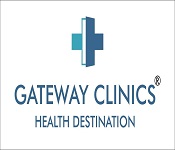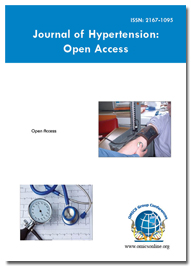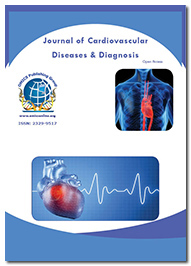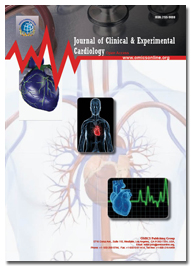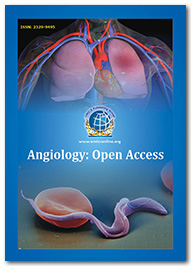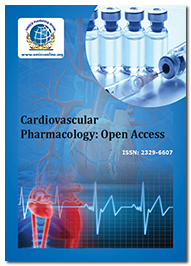Theme: Efficient preventive strategies and current trends in Management of Hypertension
Hypertension 2016
Accreditation Statement
This activity has been planned and implemented in accordance with the accreditation requirements and policies of the Accreditation Council for Continuing Medical Education (ACCME) through the joint providership of PeerPoint Medical Education Institute and Conference Series, LLC. PeerPoint Medical Education Institute is accredited by the ACCME to provide continuing medical education for physicians.
Designation Statement
PeerPoint Medical Education Institute designates the live format for this educational activity for AMA PRA Category 1 Credits™. Physicians should only claim credit commensurate with the extent of their participation in the activity.
“International Conference on Hypertension & Healthcare” from August 11-12, 2016 at Toronto, Canada. Special interest and theme of this conference is: “Efficient preventive strategies and current trends in Management of Hypertension”.
The conference aims to provide an opportunity to share knowledge, expertise along with unparalleled networking opportunities between a large number of medical professionals like Directors, Heads, Deans, Professors, Scientists, Researchers, Cardiologists and Writers of the Hypertension or Cardiology and related departments, Founders and Employees of the related companies, Associations, Organizations, Laboratory members and Young researchers working in the field of hypertension treatment and management. This conference mainly focuses on spreading the awareness about challenges in this field and how to prevent and manage hypertension.
Hypertension-2016 is an international platform for presenting research about Hypertension and related concepts, sharing alternative ideas about the severe cardiovascular risk factor, thus contributing to the dissemination of information about the trouble for the welfare of the society.
Why to attend??
Encounter the target market with members from across the globe, committed to learn about hypertension treatment and management. This is the best opportunity to outreach the largest gathering of participants from around the world. Conduct presentations, distribute and update knowledge about the current situation of hypertension treatment and receive name recognition at this 3-day event. World-eminent speakers, most recent researches, latest treatment techniques and the advanced updates in Hypertension Treatment and Management are the principal features of this conference.
Target Audience:
Our Organization would be privileged to welcome the:
- Directors of Hypertension or related Programs or Associations
- Heads, Deans and Professors of Hypertension or Cardiology and related departments
- Scientists and Researchers
- Doctors
- Writers
- Founders and Employees of the related companies
- Hypertension Associations and Organizations
- Laboratory members and Students working in the field of hypertension treatment and management
ConferenceSeries Ltd takes pride to introduce the commencement of “International Conference on Hypertension & Healthcare” from August 11-12, 2016 at Toronto, Canada. Special interest and theme of this conference is: “Efficient preventive strategies and current trends in Management of Hypertension”.
Hypertension 2016 is an international platform for presenting research about Hypertension and related concepts, sharing alternative ideas about the severe cardiovascular risk factor, thus contributing to the dissemination of information about the trouble for the welfare of the society.
The conference aims to provide an opportunity to share knowledge, expertise along with unparalleled networking opportunities between a large number of medical professionals like Directors, Heads, Deans, Professors, Scientists, Researchers, Cardiologists and Writers of the Hypertension or Cardiology and related departments, Founders and Employees of the related companies, Associations, Organizations, Laboratory members and Young researchers working in the field of hypertension treatment and management. This conference mainly focuses on spreading the awareness about challenges in this field and how to prevent and manage hypertension.
ConferenceSeries Ltd organizes 300+ Conferences Every Year across USA, Europe & Asia with support from 1000 more scientific societies and Publishes 400+ Open access journals which contains over 30000 eminent personalities, reputed scientists as editorial board members.
Track 1: Hypertension Types
Hypertension, also known as high blood pressure or arterial hypertension is a chronic medical condition in which the blood pressure in the arteries is elevated. This session mainly covers the different types of hypertension and their assessment. There are two primary hypertension types. For 95% of people with high blood pressure, the cause of their hypertension is unknown — this is called essential or primary hypertension. When a cause can be found, the condition is called secondary. Isolated systolic hypertension, malignant hypertension, and resistant hypertension are all recognized hypertension types with specific diagnostic criteria.
Assessment of hypertension basically includes: Confirmation of hypertension, Risk factors, Underlying causes, End organ damage & Indications and contraindications for antihypertensive drugs.
Hypertension is a major risk factor for heart diseases and stroke. Globally, the overall prevalence of raised blood pressure in adults aged 25 and over was around 40% in 2008. Because of population growth and ageing, the number of people with uncontrolled hypertension rose from 600 million in 1980 to nearly 1 billion in 2008.The national Million Hearts initiative endeavours to increase the number of persons whose hypertension is under control, by 10 million, as part of its goal to prevent 1 million heart attacks and strokes by the year 2017.
Related Conferences: 14th Clinical & Experimental Cardiology Conference, November 14-16, 2016 Orlando, USA; 8th Cardiologists Annual Meeting, July 18-20 2016, Germany; 13th European Cardiology Congress, October 17-19, 2016 Rome, Italy; 15th Cardiothoracic Meeting, December 5-6 2016, Philadelphia, USA; 9th Arrhythmia Meeting, July 14-15 2016, Australia ; ASH Meeting 2016; Ischemic Heart Diseases Conference, October 20-21, 2016 Chicago, USA; 4th International Conference on Prehypertension, Hypertension & Cardio Metabolic Syndrome, March 03-06 2016, Italy; European Hypertension Congress 2016 ; The Pacific Northwest Cardiovascular Summit, October 03-04 2015, Oregon; British Hypertension Society 2016 ; 3rd Annual International Conference on Cardiology & Cardiovascular Medicine Research, February 22-23 2016, Singapore; 3rd International 4 Corners of Cardiology Meeting, February 05-06 2016, Australia
Track 2: Hypertension & Obesity
Hypertension (high blood pressure) refers to the pressure that blood applies to the inner walls of the arteries. Obesity increases the risk of the development of hypertension. The respective session mainly focuses on obesity-related hypertension, its interaction with the outcomes of hypertension, risk factors, treatment and management of obesity induced hypertension.
Obesity-associated arterial hypertension is characterized by activation of the sympathetic nervous system, activation of the renin-angiotensin system, and sodium retention, among other abnormalities. It is estimated that excess body weight, accounted for approximately 26% of cases of hypertension in men and 28% in women and for approximately 23% of cases of coronary heart disease in men and 15% in women. Obese individuals have an increase in fatty tissue that increases their vascular resistance and in turn increases the work the heart has to do to pump blood throughout the body. Indicators for risk of hypertension include obesity, abdominal obesity and weight gain.
Anti-hypertension medications should be started if hypertension is diagnosed. But, with weight-loss, a significant fall in blood pressure may permit a decrease in the number of medications taken or decrease the amount of medication taken. Prevention would be better than any drug.
Given the important pathophysiologic links between weight and hypertension described, a significant increase in the prevalence of hypertension in coming years could be expected, if trends of increasing weight in the population are not stabilized and reversed.
Related Conferences: 5th International Conference on Obesity & Weight Management, December 05-07, 2016, USA; 3rd International Conference on Health Informatics & Technology, June 27-29, 2016, USA; 6th Global Healthcare Summit, August 22-24, 2016, USA; Global Summit & Expo on Healthcare, November 09-11, 2016, UAE; 5th World Congress on Controversies to Consensus in Diabetes, Obesity and Hypertension, November 05-07 2015, Turkey; American Society of Hypertension 2016; British Hypertension Society Annual Scientific Meeting, September 21-23 2015, UK; Japanese Society of Hypertension 38th Annual Scientific Meeting, October 9-11 2015, Japan; European Hypertension Congress 2016; International Conference on Epigenetics, Obesity and Metabolism, October 11-14 2015, UK; 13th International Congress on Obesity, May 01-04 2016, Canada
Track 3: Renal Hypertension
Renal hypertension, also called renovascular hypertension, is elevated blood pressure caused by kidney disease. It is a syndrome which consists of high blood pressure caused by the kidneys' hormonal response to narrowing of the arteries supplying the kidneys (renal artery stenosis). When functioning properly this hormonal axis regulates blood pressure. Due to low local blood flow, the kidneys mistakenly increase blood pressure of the entire circulatory system. It is a form of secondary hypertension a form of hypertension whose cause is identifiable. This session mainly accounts for the various causes and symptoms of renovascular hypertension, along with its pathogenesis, diagnosis and treatment.
High blood pressure is dangerous partly because the patients generally do not experience the symptoms, so organ damage can occur slowly without being recognized. Renal hypertension can cause chronic kidney disease. Various techniques have been developed to diagnose renal hypertension using digital image processing of radiographs. Medications are used first to try to control high blood pressure in renal hypertension. In some people with renal hypertension due to narrowing of the renal artery, even taking three or more medications every day may not adequately control blood pressure. In these situations, a procedure like angioplasty or stenting, to improve blood flow to the kidneys can often help.
Its prevalence is 2% in those who have a diastolic blood pressure of more than 100 mmHg and approximately 30% in patients who have diastolic blood pressure more than 130mmHg. Patients with renal hypertension are at increased risk of end organ dysfunction, including permanent kidney damage, if inadequate pharmacologic therapies are used to control blood pressure.
Related Conferences: 14th Clinical & Experimental Cardiology Conference, November 14-16, 2016 Orlando, USA; 8th Cardiologists Annual Meeting, July 18-20 2016, Germany; 13th European Cardiology Congress, October 17-19, 2016 Rome, Italy; 15th Cardiothoracic Meeting, December 5-6 2016, Philadelphia, USA; 9th Arrhythmia Meeting, July 14-15 2016, Australia ; ASH Meeting 2016; Ischemic Heart Diseases Conference, October 20-21, 2016 Chicago, USA; 4th International Conference on Prehypertension, Hypertension & Cardio Metabolic Syndrome, March 03-06 2016, Italy; European Hypertension Congress 2016 ; The Pacific Northwest Cardiovascular Summit, October 03-04 2015, Oregon; British Hypertension Society 2016 ; 3rd Annual International Conference on Cardiology & Cardiovascular Medicine Research, February 22-23 2016, Singapore; 3rd International 4 Corners of Cardiology Meeting, February 05-06 2016, Australia
Track 4: Pulmonary Hypertension
Pulmonary hypertension (PH) is an increase of blood pressure in the pulmonary artery, pulmonary vein, or pulmonary capillaries, leading to shortness of breath, dizziness, fainting, leg swelling and other symptoms. Having pulmonary arterial hypertension (PAH) means that one has a high blood pressure in the arteries that go from the lungs to heart. Symptoms of pulmonary hypertension do not usually occur until the condition has progressed. The first symptom of pulmonary hypertension is usually shortness of breath with everyday activities, such as climbing stairs. Fatigue, dizziness, and fainting spells also can be symptoms. The molecular mechanism of pulmonary arterial hypertension (PAH) is not known yet, but it is believed that the endothelial dysfunction results in a decrease in the synthesis of endothelium-derived vasodilators such as nitric oxide and prostacyclin. Diagnosis of the severe heart condition includes mainly Echocardiography or as per the signs and symptoms of the condition.
The various related issues with Pulmonary Hypertension include HIV Associated Pulmonary Hypertension, Liver Disease and Pulmonary Hypertension and PH in Association with Sickle Cell Disease.
Idiopathic pulmonary arterial hypertension is a rare disease with an incidence of about 2-3 cases per million per year and a prevalence of about 15 per million. Adult females are almost three times more likely to be present with IPAH than adult males. The presentation of IPAH within children is more evenly split along gender lines. Up to 4% of people who suffer a pulmonary embolism go on to develop chronic thromboembolic disease including pulmonary hypertension. Levels of mortality are very high in pregnant women with severe pulmonary hypertension.
Related Conferences: 5th International Conference on Obesity & Weight Management, December 05-07, 2016, USA; 3rd International Conference on Health Informatics & Technology, June 27-29, 2016, USA; 6th Global Healthcare Summit, August 22-24, 2016, USA; Global Summit & Expo on Healthcare, November 09-11, 2016, UAE; 5th World Congress on Controversies to Consensus in Diabetes, Obesity and Hypertension, November 05-07 2015, Turkey; American Society of Hypertension 2016; British Hypertension Society Annual Scientific Meeting, September 21-23 2015, UK; Japanese Society of Hypertension 38th Annual Scientific Meeting, October 9-11 2015, Japan; European Hypertension Congress 2016; International Conference on Epigenetics, Obesity and Metabolism, October 11-14 2015, UK; 13th International Congress on Obesity, May 01-04 2016, Canada
Track 5: Pediatric Hypertension
Obesity has become an increasingly important medical problem in children and adolescents. Primary hypertension is detectable in children and adolescents and, as in adults, is associated with a positive family history of hypertension, obesity, and life-style factors. Among children and adolescents with primary hypertension; the presence of obesity was associated with marked LVH. Most childhood hypertension, particularly in preadolescents, is secondary to an underlying disorder. Renal parenchymal disease is the most common (60 to 70%) cause of hypertension. Adolescents usually have primary or essential hypertension, making up 85 to 95% of cases.
The investigations have showed that children in the highest quartile of BP had significantly narrower retinal arterioles than those with lower BP, suggesting that higher BP in childhood is associated with alteration in the microvasculature. There is even emerging evidence that cognitive function is adversely affected by elevated blood pressure in childhood. This session includes the epidemiology, incidence and pathophysiology of pediatric hypertension related with obesity, along with the cardiovascular risk factors, the onset of hypertension and obesity on children and the treatment and management of pediatric hypertension and obesity.
Related Conferences: 14th Clinical & Experimental Cardiology Conference, November 14-16, 2016 Orlando, USA; 8th Cardiologists Annual Meeting, July 18-20 2016, Germany; 13th European Cardiology Congress, October 17-19, 2016 Rome, Italy; 15th Cardiothoracic Meeting, December 5-6 2016, Philadelphia, USA; 9th Arrhythmia Meeting, July 14-15 2016, Australia ; ASH Meeting 2016; Ischemic Heart Diseases Conference, October 20-21, 2016 Chicago, USA; 4th International Conference on Prehypertension, Hypertension & Cardio Metabolic Syndrome, March 03-06 2016, Italy; European Hypertension Congress 2016 ; The Pacific Northwest Cardiovascular Summit, October 03-04 2015, Oregon; British Hypertension Society 2016 ; 3rd Annual International Conference on Cardiology & Cardiovascular Medicine Research, February 22-23 2016, Singapore; 3rd International 4 Corners of Cardiology Meeting, February 05-06 2016, Australia
Track 6: Gestational Hypertension
Gestational hypertension or pregnancy-induced hypertension (PIH) is the development of new hypertension in a pregnant woman after 20 weeks gestation without the presence of protein in the urine or other signs of Pre-eclampsia in pregnancy. It is a temporary diagnosis for hypertensive pregnant women who do not meet criteria for preeclampsia or chronic hypertension (hypertension first detected before the 20th week of pregnancy). The diagnosis is changed to, Preeclampsia, if proteinuria or new signs of end-organ dysfunction develop and chronic (primary or secondary) hypertension, if blood pressure elevation persists ≥12 weeks postpartum.
The risk factors for Gestational hypertension comprise maternal causes like obesity, past history or adolescent pregnancy, multiple gestations, and family history. There is no specific treatment, but it is monitored closely to rapidly identify pre-eclampsia and its life-threatening complications. Drug treatment options are limited, as many antihypertensive drugs may negatively affect the foetus. During gestational hypertension a women must be offered an integrated package of care, covering admission to hospital, treatment, measurement of blood pressure, testing for proteinuria and blood tests.
Gestational hypertension in a future pregnancy ranges from about 1 in 8 (13%) pregnancies to about 1 in 2 (53%) pregnancies.
Related Conferences: 5th International Conference on Obesity & Weight Management, December 05-07, 2016, USA; 3rd International Conference on Health Informatics & Technology, June 27-29, 2016, USA; 6th Global Healthcare Summit, August 22-24, 2016, USA; Global Summit & Expo on Healthcare, November 09-11, 2016, UAE; 5th World Congress on Controversies to Consensus in Diabetes, Obesity and Hypertension, November 05-07 2015, Turkey; American Society of Hypertension 2016; British Hypertension Society Annual Scientific Meeting, September 21-23 2015, UK; Japanese Society of Hypertension 38th Annual Scientific Meeting, October 9-11 2015, Japan; European Hypertension Congress 2016; International Conference on Epigenetics, Obesity and Metabolism, October 11-14 2015, UK; 13th International Congress on Obesity, May 01-04 2016, Canada
Track 7: Hypertension Risk Factors
High Blood Pressure has many causative factors such as age, race, family history, obesity, not being physically active, consuming tobacco, too much salt (sodium) in diet, too little potassium and vitamin D in diet, drinking too much alcohol, stress and certain chronic conditions. There are general risk factors that can be responsible for raising anyone's risk of hypertension. Although high blood pressure is most common in adults, children may be at risk, too. For some children, high blood pressure is caused by problems with the kidneys or heart. But for a growing number of kids, poor lifestyle habits, such as an unhealthy diet, obesity and lack of exercise, contribute to high blood pressure. Sometimes pregnancy contributes to high blood pressure, as well. Certain diseases and medications are specific causes of high blood pressure.
Cardiovascular disease represents the leading cause of morbidity and mortality in Western countries, and hypertension-related cardiovascular events or hypertensive emergencies affect about 37 million people per year, worldwide. In this perspective, hypertensive patients are at increased risk to experience cardiovascular events during life-long period, and treatment of high blood pressure represents one of the most effective strategies to reduce global cardiovascular risk.
Related Conferences: 14th Clinical & Experimental Cardiology Conference, November 14-16, 2016 Orlando, USA; 8th Cardiologists Annual Meeting, July 18-20 2016, Germany; 13th European Cardiology Congress, October 17-19, 2016 Rome, Italy; 15th Cardiothoracic Meeting, December 5-6 2016, Philadelphia, USA; 9th Arrhythmia Meeting, July 14-15 2016, Australia ; ASH Meeting 2016; Ischemic Heart Diseases Conference, October 20-21, 2016 Chicago, USA; 4th International Conference on Prehypertension, Hypertension & Cardio Metabolic Syndrome, March 03-06 2016, Italy; European Hypertension Congress 2016 ; The Pacific Northwest Cardiovascular Summit, October 03-04 2015, Oregon; British Hypertension Society 2016 ; 3rd Annual International Conference on Cardiology & Cardiovascular Medicine Research, February 22-23 2016, Singapore; 3rd International 4 Corners of Cardiology Meeting, February 05-06 2016, Australia
Track 8: Hypertension Diagnosis
Hypertension, or high blood pressure, is the leading risk factor associated with death in the world but is largely asymptomatic and often undetected in patients. Hypertension is typically asymptomatic and only detected through opportunistic screening. Symptoms only manifest when blood pressure reaches very high levels (usually >200 mmHg systolic), and can include headache, dizziness and nose bleeding. It is usually diagnosed when a patient’s blood pressure is repeatedly found to be 140/90 mmHg or higher in a clinical setting and average readings taken using ambulatory blood pressure monitoring or monitoring at home are higher than 135/85 mmHg. Once hypertension has been diagnosed, further tests should be conducted, including urine testing, blood tests, an eye examination and a 12-lead electrocardiogram (ECG).Primary hypertension, in which no specific cause is found, affects 95% of patients.
Blood pressure is expressed in terms of systolic blood pressure (higher reading), which reflects the blood pressure when the heart is contracted (systole), and diastolic blood pressure (lower reading), which reflects the blood pressure during relaxation (diastole). Hypertension can be diagnosed when either systolic pressure, diastolic pressure, or both are raised.
Blood pressure is determined by the cardiac output balanced against systemic vascular resistance. The process of maintaining blood pressure is complex, and involves numerous physiological mechanisms, including arterial baroreceptors, the renin–angiotensin–aldosterone system, atrial natriuretic peptide, endothelins, and mineralocorticoid and glucocorticoid steroids.
Related Conferences: 5th International Conference on Obesity & Weight Management, December 05-07, 2016, USA; 3rd International Conference on Health Informatics & Technology, June 27-29, 2016, USA; 6th Global Healthcare Summit, August 22-24, 2016, USA; Global Summit & Expo on Healthcare, November 09-11, 2016, UAE; 5th World Congress on Controversies to Consensus in Diabetes, Obesity and Hypertension, November 05-07 2015, Turkey; American Society of Hypertension 2016; British Hypertension Society Annual Scientific Meeting, September 21-23 2015, UK; Japanese Society of Hypertension 38th Annual Scientific Meeting, October 9-11 2015, Japan; European Hypertension Congress 2016; International Conference on Epigenetics, Obesity and Metabolism, October 11-14 2015, UK; 13th International Congress on Obesity, May 01-04 2016, Canada
Track 9: Pharmacological Treatments for Hypertension
Medications to treat high blood pressure includes Thiazide diuretics, Beta blockers, Angiotensin-converting enzyme (ACE) inhibitors, Angiotensin II receptor blockers (ARBs), Calcium channel blockers and Renin inhibitors. Additional medication sometimes used to treat high blood pressure comprises Alpha blockers, Alpha-beta blockers, Central-acting agents, Vasodilators and Aldosterone antagonists.
No matter what medications a doctor prescribes to treat high blood pressure, lifestyle changes are required to lower blood pressure. Eating a healthier diet with less, exercising regularly, quitting smoking, limiting the amount of alcohol, maintaining a healthy weight or losing weight must be followed up to control high blood pressure.
Related Conferences: 14th Clinical & Experimental Cardiology Conference, November 14-16, 2016 Orlando, USA; 8th Cardiologists Annual Meeting, July 18-20 2016, Germany; 13th European Cardiology Congress, October 17-19, 2016 Rome, Italy; 15th Cardiothoracic Meeting, December 5-6 2016, Philadelphia, USA; 9th Arrhythmia Meeting, July 14-15 2016, Australia ; ASH Meeting 2016; Ischemic Heart Diseases Conference, October 20-21, 2016 Chicago, USA; 4th International Conference on Prehypertension, Hypertension & Cardio Metabolic Syndrome, March 03-06 2016, Italy; European Hypertension Congress 2016 ; The Pacific Northwest Cardiovascular Summit, October 03-04 2015, Oregon; British Hypertension Society 2016 ; 3rd Annual International Conference on Cardiology & Cardiovascular Medicine Research, February 22-23 2016, Singapore; 3rd International 4 Corners of Cardiology Meeting, February 05-06 2016, Australia
Track 10: Hypertensive Emergency
Complications of hypertension are clinical outcomes that result from persistent elevation of blood pressure. Hypertension is a risk factor for all clinical manifestations of atherosclerosis since it is a risk factor for atherosclerosis itself. It is an independent predisposing factor for heart failure, coronary artery disease, stroke, renal disease, and peripheral arterial disease. It is the most important risk factor for cardiovascular morbidity and mortality, in industrialized countries.
The various complications or manifestations arising due to high blood pressure include Hypertension Retinopathy, Primary Hypertension, Secondary Hypertension, Hypertensive Crisis, Gestational Hypertension, Ocular Hypertension and Epithelial Seizure in Children, Risk of Ischemic Heart Disease, Cognitive Impairment and Dementia, Hypertensive Nephropathy.
Uncontrolled high blood pressure can lead to different risk factors like heart attack or stroke, heart failure, aneurysm, weakened and narrowed blood vessels in kidneys, trouble with memory or understanding, thickened, narrowed or torn blood vessels in the eyes and metabolic syndrome.
Related Conferences: 5th International Conference on Obesity & Weight Management, December 05-07, 2016, USA; 3rd International Conference on Health Informatics & Technology, June 27-29, 2016, USA; 6th Global Healthcare Summit, August 22-24, 2016, USA; Global Summit & Expo on Healthcare, November 09-11, 2016, UAE; 5th World Congress on Controversies to Consensus in Diabetes, Obesity and Hypertension, November 05-07 2015, Turkey; American Society of Hypertension 2016; British Hypertension Society Annual Scientific Meeting, September 21-23 2015, UK; Japanese Society of Hypertension 38th Annual Scientific Meeting, October 9-11 2015, Japan; European Hypertension Congress 2016; International Conference on Epigenetics, Obesity and Metabolism, October 11-14 2015, UK; 13th International Congress on Obesity, May 01-04 2016, Canada
Track 11: Hypertension Management
High blood pressure, which is also called hypertension, increases the risk of developing many serious health problems, including heart disease, stroke, and kidney disease. Evaluation and Treatment of High Blood Pressure recommendations have defined “hypertension” as a BP of ≥140/90 mm Hg. The risk of cardiovascular diseases in patients with hypertension can be greatly reduced with effective antihypertensive therapy.
Maintenance of normal body weight, following a proper diet plan, lifestyle modification including exercise, avoiding high-sodium content foods, limited alcohol consumption and appropriate medications as prescribed by the doctor may lead to a controlled and manageable blood pressure account. Also monitoring the blood pressure regularly may prevent hypertension and reduce the risk of high blood pressure-related health problems.
Related Conferences: 14th Clinical & Experimental Cardiology Conference, November 14-16, 2016 Orlando, USA; 8th Cardiologists Annual Meeting, July 18-20 2016, Germany; 13th European Cardiology Congress, October 17-19, 2016 Rome, Italy; 15th Cardiothoracic Meeting, December 5-6 2016, Philadelphia, USA; 9th Arrhythmia Meeting, July 14-15 2016, Australia ; ASH Meeting 2016; Ischemic Heart Diseases Conference, October 20-21, 2016 Chicago, USA; 4th International Conference on Prehypertension, Hypertension & Cardio Metabolic Syndrome, March 03-06 2016, Italy; European Hypertension Congress 2016 ; The Pacific Northwest Cardiovascular Summit, October 03-04 2015, Oregon; British Hypertension Society 2016 ; 3rd Annual International Conference on Cardiology & Cardiovascular Medicine Research, February 22-23 2016, Singapore; 3rd International 4 Corners of Cardiology Meeting, February 05-06 2016, Australia
Track 12: Hypertension Epidemiology
Hypertension is a powerful risk factor for fatal and nonfatal cardiovascular disease events. Data from observational studies indicate that this risk is continuous, without evidence of a threshold, down to blood pressures as low as 115/75 mm Hg. Randomized controlled trials have convincingly shown that treatment of hypertension reduces the risk of stroke, coronary heart disease, congestive heart failure, and mortality. Various studies of hypertension control have been performed in a variety of epidemiological and practice settings.
Despite the recognition that diabetic persons are at especially high risk of cardiovascular disease, studies suggest that hypertension is as poorly controlled in diabetic persons as it is in non-diabetics. Chronic kidney disease represents another comorbidity associated with both difficult blood pressure control and high cardiovascular risk. Various patient characteristics have been associated with uncontrolled hypertension, including age, obesity, and lack of exercise. These characteristics are risk factors for hypertension itself and presumably contribute directly to difficult blood pressure control.
Related Conferences: 5th International Conference on Obesity & Weight Management, December 05-07, 2016, USA; 3rd International Conference on Health Informatics & Technology, June 27-29, 2016, USA; 6th Global Healthcare Summit, August 22-24, 2016, USA; Global Summit & Expo on Healthcare, November 09-11, 2016, UAE; 5th World Congress on Controversies to Consensus in Diabetes, Obesity and Hypertension, November 05-07 2015, Turkey; American Society of Hypertension 2016; British Hypertension Society Annual Scientific Meeting, September 21-23 2015, UK; Japanese Society of Hypertension 38th Annual Scientific Meeting, October 9-11 2015, Japan; European Hypertension Congress 2016; International Conference on Epigenetics, Obesity and Metabolism, October 11-14 2015, UK; 13th International Congress on Obesity, May 01-04 2016, Canada
Track 13: Advanced Treatment Approaches
Treating high blood pressure can take a multi-pronged approach including diet changes, medication, and exercise. Hypertension, or high blood pressure, is dangerous because it can lead to strokes, heart attacks, heart failure, or kidney disease. The goal of hypertension treatment is to lower high blood pressure and protect important organs, like the brain, heart, and kidneys from damage. Treatment for hypertension has been associated with reductions in stroke (reduced an average of 35%-40%), heart attack (20%-25%), and heart failure (more than 50%), according to research.
Because hypertension rarely causes specific symptoms, it is not identified until an individual’s blood pressure is measured by a physician or it causes a catastrophic complication such as stroke or heart attack. Accurate diagnosis by blood pressure measurement is essential. Many advanced treatment approaches and medications have been established for the treatment and management of hypertension that may describe this session.
Related Conferences: 14th Clinical & Experimental Cardiology Conference, November 14-16, 2016 Orlando, USA; 8th Cardiologists Annual Meeting, July 18-20 2016, Germany; 13th European Cardiology Congress, October 17-19, 2016 Rome, Italy; 15th Cardiothoracic Meeting, December 5-6 2016, Philadelphia, USA; 9th Arrhythmia Meeting, July 14-15 2016, Australia ; ASH Meeting 2016; Ischemic Heart Diseases Conference, October 20-21, 2016 Chicago, USA; 4th International Conference on Prehypertension, Hypertension & Cardio Metabolic Syndrome, March 03-06 2016, Italy; European Hypertension Congress 2016 ; The Pacific Northwest Cardiovascular Summit, October 03-04 2015, Oregon; British Hypertension Society 2016 ; 3rd Annual International Conference on Cardiology & Cardiovascular Medicine Research, February 22-23 2016, Singapore; 3rd International 4 Corners of Cardiology Meeting, February 05-06 2016, Australia
Track 14: Naturopathic Remedies
Hypertensive people can remarkably reduce their blood pressure through nutritional changes. Increasing the amount of vegetables and fruit and reducing the amount of fat and cholesterol will not only reduce blood pressure but can help with weight loss, which also lowers blood pressure. Herbal medicines rarely have significant side effects when used appropriately and at suggested doses. Some supplements may help decrease hypertension. Apart from herbs such as Arjuna bark, olive leaf extract, and hawthorn, natural remedies like cocoa, garlic, Indian snakeroot or sarpagandha also helps in lowering hypertension.
Yoga and naturopathic lifestyle intervention aims at eliminating the root cause of the disease rather than its symptoms. Relaxation techniques such as yoga with breathing exercises can help in relaxing and reducing the stress levels and consequently lower high blood pressure. It is proven beyond doubt that regular practice of yogic lifestyle can prevent and control hypertension. Moreover, appropriate homeopathic remedy may also help in lowering high blood pressure and hypertension management.
Related Conferences: 5th International Conference on Obesity & Weight Management, December 05-07, 2016, USA; 3rd International Conference on Health Informatics & Technology, June 27-29, 2016, USA; 6th Global Healthcare Summit, August 22-24, 2016, USA; Global Summit & Expo on Healthcare, November 09-11, 2016, UAE; 5th World Congress on Controversies to Consensus in Diabetes, Obesity and Hypertension, November 05-07 2015, Turkey; American Society of Hypertension 2016; British Hypertension Society Annual Scientific Meeting, September 21-23 2015, UK; Japanese Society of Hypertension 38th Annual Scientific Meeting, October 9-11 2015, Japan; European Hypertension Congress 2016; International Conference on Epigenetics, Obesity and Metabolism, October 11-14 2015, UK; 13th International Congress on Obesity, May 01-04 2016, Canada
Track 15: Case Reports
High blood pressure, also known as hypertension, affects millions -- even children and teens. It is a common condition that catches up with most people who live into older age. The exact cause of hypertension is unknown, but there are several factors and conditions that may contribute to its occurrence. About one in every four adults has hypertension.
High blood pressure is often called a "silent disease" because people usually don't know they have it; there may be no outward symptoms or a sign, so monitoring the blood pressure is critical. Treating high blood pressure can take a multi-pronged approach including diet changes, medication, and exercise. Hypertension treatment comes in many forms -- from lifestyle changes to medication.
Thus, case study on patients with different forms of Hypertension, may lead to a better way of improvement in emerging ideas or techniques for treating High Blood Pressure.
Related Conferences: 14th Clinical & Experimental Cardiology Conference, November 14-16, 2016 Orlando, USA; 8th Cardiologists Annual Meeting, July 18-20 2016, Germany; 13th European Cardiology Congress, October 17-19, 2016 Rome, Italy; 15th Cardiothoracic Meeting, December 5-6 2016, Philadelphia, USA; 9th Arrhythmia Meeting, July 14-15 2016, Australia ; ASH Meeting 2016; Ischemic Heart Diseases Conference, October 20-21, 2016 Chicago, USA; 4th International Conference on Prehypertension, Hypertension & Cardio Metabolic Syndrome, March 03-06 2016, Italy; European Hypertension Congress 2016 ; The Pacific Northwest Cardiovascular Summit, October 03-04 2015, Oregon; British Hypertension Society 2016 ; 3rd Annual International Conference on Cardiology & Cardiovascular Medicine Research, February 22-23 2016, Singapore; 3rd International 4 Corners of Cardiology Meeting, February 05-06 2016, Australia
Conference Series LLC is glad to invite you to the “International Conference on Hypertension & Healthcare” to be held during August 11-12, 2016 at Toronto, Canada. The conference emphasizes the theme “Efficient preventive strategies and current trends in Management of Hypertension” focusing on the latest ideas and advances for hypertension treatment and management. Hypertension 2016 event welcomes the innovative strategies in the area of hypertension research and also proposes a unique opportunity for the explorers from all over the world to gather, share and perceive new scientific interactions upon the various perceptions of hypertension.
OMICS International organizes 300+ Conferences Every Year across USA, Europe & Asia with support from 1000 more scientific societies and Publishes 400+ Open access journals which contains over 30000 eminent personalities, reputed scientists as editorial board members.
For more details please visit: http://hypertension.conferenceseries.com/
Conference Highlights:
- Hypertension
- Hypertension & Obesity
- Renal Hypertension
- Pulmonary Hypertension
- Paediatric Hypertension
- Gestational Hypertension
- Hypertension Risk Factors
- Hypertension Diagnosis
- Pharmacological Treatments for Hypertension
- Hypertensive Emergency
- Hypertension Management
- Hypertension Epidemiology
- Advanced Treatment Approaches
- Naturopathic Remedies
- Case Reports
Importance & Scope:
Hypertension is a major risk factor for cardiovascular diseases, cerebrovascular events and ischaemic heart diseases, so is therefore one of the most important preventable causes of premature morbidity and mortality in developed and developing countries. It is often symptomless, so screening is vital before damage is done. Many surveys continue to show that hypertension remains underdiagnosed, undertreated and poorly controlled. Overall, the prevalence of hypertension (at least ≥140/90 mm Hg or on treatment) in those aged over 35 was observed to be 32% in men and 27% in women.
Blood Pressure has a skewed normal distribution within the population and the currently accepted model assumes risk is continuously related to BP. Essential hypertension (primary, cause unknown) accounts for the majority of cases, particularly in the older patient.
Hypertension 2016 is an international platform for presenting research about Hypertension and related concepts, sharing alternative ideas about the severe cardiovascular risk factor, thus contributing to the dissemination of information about the trouble for the welfare of the society.
Overall Prevalence of Hypertension Globally

Why Canada?
2013, 17.7% (5.3 million) of Canadians aged 12 and older reported being diagnosed with high blood pressure. This was not a significant change from 2012, though it is an increase from 16.9% in 2009.In 2007/08, about 6 million adults (23.0%) were living with diagnosed hypertension and about 418 000 had a new diagnosis. The age-standardized prevalence increased significantly from 12.5% in 1998/99 to 19.6% in 2007/08, and the incidence decreased from 2.7 to 2.4 per 100.All-cause mortality was higher among adults with diagnosed hypertension than among those without diagnosed hypertension.These findings highlight the need to continue monitoring the effectiveness of efforts for managing hypertension and to enhance public health programs aimed at preventing hypertension in Canada.
There a large number of institutes and associations in Canada dealing with the researches on Hypertension. Moreover, there have been many public and patient hypertension knowledge translation programmes organised in Canada, to improve self-efficacy in the prevention and management of hypertension.
These developments and their corresponding consequences have accompanied Canada in becoming a recognized world leader in hypertension prevention and control. Thus, Canada has been chosen to conduct the conference Hypertension-2016.
Why to attend?
Encounter the target market with members from across the globe, committed to learn about hypertension treatment and management. This is the best opportunity to outreach the largest gathering of participants from around the world. Conduct presentations, distribute and updateknowledge about the current situation of hypertension treatment and receive name recognition at this 3-day event. World-eminent speakers, most recent researches, latest treatment techniques and the advanced updates in Hypertension Treatment and Management are the principal features of this conference.
Members Associated With Hypertension:

Hospitals Associated with Hypertension in Toronto:
- Toronto General Hospital
- Pulmonary Hypertension Clinic
Hospitals Associated with Hypertension in Canada:
- Peter Lougheed Centre
- Pulmonary Hypertension Clinic
- Vancouver Coastal Health
- Winnipeg Pulmonary Hypertension Centre
- Pulmonary Hypertension Coinic
- Kingston Respiratory Center
- Victoria Hospital
- Pulmonary Hypertension Clinic
- Center for Pulmonary Hypertension
- Royal University Hospital
- Jewish General Hospital
Hospitals around the globe Associated with Hypertension & Treatment:
- University Hospitals
- Medical College of Wisconsin
- American Heart Association
- Thomas Jefferson University Hospitals
- Massachusetts General Hospital
- Seattle Children’s Hospital
- St Vincent's Hospital
- University Hospital Gasthuisberg
- Alfred Hospital
- Flinders Medical Centre
- Prince Charles Hospital
- The Wesley Pulmonary Hypertension Unit QL
- WA Pulmonary Hypertension Service
- The Wesley Pulmonary Hypertension Unit
- Respiratory Medicine
- Pulmonary Vascular Clinic
Hospitals Associated with Hypertension:

Major Associations in Toronto:
- Heart and Stroke Foundation of Ontario (HFSO)
- Pulmonary Hypertension Association of Canada: Toronto
Major Associations in Canada:
- Pulmonary Hypertension Association of Canada
- Canadian Hypertension Society
- Heart and Stroke Foundation of Canada
Major Associations dealing with Hypertension around the globe:
- St. Lucia Diabetes & Hypertension Association (SLDHA)
- British Hypertension Society
- American Society of Hypertension
- Pulmonary Hypertension Association
- American Heart Association's Council on Hypertension
- Pulmonary Vascular Research Institute
- International Society of Hypertension
- European Society of Cardiology
- Argentine Society of Hypertension
- Asian Pacific Society of Hypertension
- Austrian Society of Hypertension
- Belgian Hypertension Committee
- Belorussian Hypertension League
- Botswana - Heart Foundation of Botswana
- Brazilian Society of Hypertension
- Bulgarian Hypertension League
- Cameroon Cardiac Society
- Chinese Hypertension League
- Council for High Blood Pressure of the Irish Heart Foundation
- Council for the High Blood Pressure Research of the AHA
- Croatian Society of Hypertension
- Danish Hypertension Society
- Egyptian Hypertension Society
- Estonian Society of Hypertension
- European Council for Cardiovascular Research
- European Society of Hypertension
- French Society of Hypertension
- German Hypertension Society
- Hellenic Society for the Study of Hypertension
- High Blood Pressure Research Council of Australia
- Hong Kong College of Cardiology
- Inter-American Society of Hypertension
- Israeli Society of Hypertension
- Italian Society of Hypertension
- Japanese Society of Hypertension
- Korean Society of Hypertension
- Latin American Society of Hypertension
- Libyan Cardiac Society
- Lithuanian Hypertension Society
- Malaysian Society of Hypertension
- Norwegian Society of Hypertension
- Pakistan Hypertension League
- Pulse of Asia
- Russian Antihypertensive League
- Serbian Society of Hypertension

Target Audience:
Our Organization would be privileged to welcome the Directors, Heads, Deans, Professors, Scientists, Researchers, Doctors and Writers of the Hypertension or Cardiology and related departments, Founders and Employees of the related companies, Associations, organizations, laboratory members and Students working in the field of hypertension treatment and management.
Top Universities in Toronto:
- University of Toronto
- McGill University
Top Universities in Canada:
- University of Ottawa Heart Institute
- University of Alberta
- Dalhousie University
- McMaster University
- University of Toronto
- McGill University
- University of British Columbia
Top Universities around the Globe:
- University of Rochester Medical Center
- Tulane University - School of Medicine
- University of Chicago Medical Center
- Yale University
- University of Pennsylvania in Philadelphia
- Stanford University in Stanford
- University of Michigan
- University of Texas South-western Medical Center
- University of Washington
- University of Minnesota Medical Center
- University of Valencia
- Duke University School of Medicine
- University of Milano-Bicocca
- University of Padua
- University of Barcelona
- University of Florence
- University of Florence
- University Hospital Maastricht
- University of Athens
Top Universities Associated with Hypertension:

Industries Associated with Hypertension in Toronto:
- Medesync
- Precision
- Banting and Best's Laboratory
- Apotex
Industries Associated with Hypertension in Canada:
- Loblaw Companies Limited
- Biovail Pharmaceuticals Canada
- Zenlabs
- Wragge Lawrence Graham & Co LLP
- Plunkett Research, Ltd.
Industries Associated with Hypertension around the Globe:
- Novartis
- Co. Schering
- AstraZeneca
- Generic
- GlaxoSmithKline
- Biogen Idec
- Gilead Sciences, Inc.
- Boehringer Ingelheim
- Micardis®
- Metalyse®
- Lupin Limited
- Sanofi S.A.
- Johnson & Johnson Ltd.
- Pfizer, Inc.
- Ranbaxy Laboratories Limited
- Merck & Co., Inc.
- Astra Zeneca Plc
- Daiichi Sankyo Company Limited
- Takeda Pharmaceutical Company Limited
Industries Associated with Hypertension:

Global Market Value on Hypertension:

Market Growth of Hypertension Research in the last and upcoming Years:

Global Market at a Glimpse:
High blood pressure or hypertension is the most important risk factor for cardiovascular disease.In over 90% of cases there may be no identifiable cause of hypertension, in which case the condition is known as essential hypertension. The remaining 10% of cases, hypertension may be secondary in nature as a consequence of another medical problem, such as kidney disorders, adrenal tumours, or some drugs.
The prevalence of hypertension is forecasted to grow from 234 million in 2010 to 246 million in 2016 across the seven major markets (France, Germany, Italy, Spain, UK, US, and Japan). In 2016, the US is still expected to be the largest market for hypertension, with an anticipated 83 million sufferers, followed by Japan at 49 million. According to the International Society of Hypertension, there is a clear recognition of hypertension as a major public health issue across all the 7MM.
The global cardiovascular market recorded a sale of $170bn in the year 2010 and is set to grow to $187bn in 2016 at a CAGR of 1.6%. The US continued to be the largest market, with a share of 40% of the overall market. Antihypertensives remained the largest drug class in the year 2010, with a global sale of $37.6bn and a global market share of 22%.
The global market for hypertension management devices is a variable and dynamic market that will experience a strong growth through the year 2023 as an increasing number of devices would become available to address a largely unmet clinical needs.
Fund Allotment to Hypertension Research:
The NIH (National Institute of Health) Funding Opportunity Announcement (FOA), funded by the Patient-Centered Outcomes Research Institute (PCORI), funds up to two new patient-centred comparative effectiveness clinical trials, with the goal of comparing alternative, evidence-based ways to reduce inadequate control of hypertension and disparities in outcomes among high-risk populations, including racial/ethnic minority groups, patients with low socioeconomic status (SES), and individuals residing in rural geographical areas with an above average lifetime risk of cardiovascular disease (CVD). This initiative is supported by the Hypertension Disparities Reduction Program Partnership (HDRPP), a research partnership between NHLBI, NINDS and PCORI, with funds provided by PCORI to the NIH.
The fund allotment granted by the NIH is raised up to $21,500,000 worldwide for supporting research works associated with the advances in treatment and management of Hypertension.
Fund Allotment Statistics:

Statistics of Physicians, Researchers and Academicians working on Hypertension:
The estimated statistics of the number of physicians, academicians and researchers working upon the advancement in the treatment and management of hypertension are as described in the pie chart here in.

Conference Highlights
- Hypertension
- Hypertension & Obesity
- Renal Hypertension
- Pulmonary Hypertension
- Pediatric Hypertension
- Gestational Hypertension
- Hypertension Risk Factors
- Hypertension Diagnosis
- Pharmacological Treatments for Hypertension
- Hypertensive Emergency
- Hypertension Management
- Hypertension Epidemiology
- Advanced Treatment Approaches
- Naturopathic Remedies
- Case Reports
- Entrepreneurs Investment Meet
- Cardiologists training and education
- Experimental Hypertension
To share your views and research, please click here to register for the Conference.
To Collaborate Scientific Professionals around the World
| Conference Date | August 11-12, 2016 | ||
| Sponsors & Exhibitors |
|
||
| Speaker Opportunity Closed | Day 1 | Day 2 | |
| Poster Opportunity Closed | Click Here to View | ||
Useful Links
Special Issues
All accepted abstracts will be published in respective Our International Journals.
- Journal of Hypertension: Open Access
- Journal of Clinical & Experimental Cardiology
- Journal of Cardiovascular Diseases & Diagnosis
Abstracts will be provided with Digital Object Identifier by





